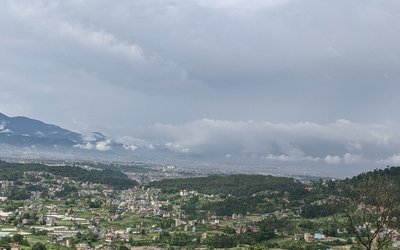Opening a junked and rusty political lock with an untainted and softconstitutional key is not an easy task for the newly appointed Chairperson of the Interim Council of Ministers surrounded by democratically tired and failed political leaders of the country. Can ‘election’ alone be the noble and sole democratic mission, save the country from the political mess that the politicians have created?
This is a question that needs to be answered by those who are seriously concerned about the future of Nepal and the region today. The people in general must have been happy with the prospect of so far denied new election. But, many members of the legal and intellectual community in particular enlightened youths of the society are not ready yet to believe in the high political risk taken up by the judiciary and the political parties, including international community through their expressed support. Since there is no viable alternative before us, all are impelled to swallow the distasteful legal bone and follow the controversial path of ‘political exit’ offered in the name of an ‘electoral poll’ to determine the destiny of the country. This will eventually depend on the guarantee of free and fair electoral process that enables people to fearlessly express their voice through ‘ballots’ in a congenial democratic environment.
The amounts of constitutional risk vis-a-vis utterly needed political exit for the country are at logger-head, and at the point of collision which troubles both the legal and political communities, as a sensitive balance is urgently required between the two. Perhaps, this could be the biggest worry for both the Head of State and Head of the Government at the moment. The moot question before the nation however is: constitutional risk at what cost and political exit in whose interest? Can democracy, rule of law and constitutionalism be compromised for the failures of one generation of political leadership and their poor vision and wrong handling of democratic and constitutional system? Are the people and nation going to be the ultimate beneficiary of these risks and compromises? Answers are not easy to find. And no wonder lawyers are upset, and many honest political leaders disturbed. If we see a series of political and constitutional tsunamis the country had to pass through in the recent past, one must admit that ‘Nepal is a solid and rocky country of Himalayan height blessed with time tested culture of peace and tolerance’, as it has resisted all odds and not bowed down to being a politically failed state yet. Even after twelve years of torturous armed conflict and four years of the failed Constituent Assembly experiment that could not deliver a Constitution, the people are still looking for an election of the new CA. We must salute the tolerance of the people who have not rejected and discredited the leaders and political parties of the dissolved CA who failed to even produce a draft of the promised Constitution. They might however do so if the elections are timely held.
During the stretched four year tenure of the expired CA, the Chairman and then Prime Minister, including all political parties, blatantly disrespected the Supreme Court's order to deliberate on options and constitutional exits in case CA was not able to produce a new Constitution within the prescribed period. The PM unconstitutionally declared election date through his cabinet, and failed two times to hold the elections for the new CA as promised. For over ten months, the political parties failed to agree on a new PM to head the electoral government. The caretaker Government continued to rule in violation of constitutional and political norms for a period exceeding nine months despite repeated advice and warning from the Head of State.
Eventually, a political exit has been offered through extraordinary exercise of a constitutional clause (Article 158) in the guise of ‘removal of constitutional obstacles’ for holding elections for the new CA. ‘Political legitimacy’ under the garb of ‘election’ for CA to enable people to articulate their voice is being offered through controversial constitutional arrangement, i.e., the Chief Justice heading an interim electoral government, which many democratic constitutional experts are having hard time to digest. The politicians themselves have admitted this as ‘undesired but a compelling compromise’ in the interest of the nation. Despite all such political anomalies and abnormalities, the country is sustaining hope and is determined not to fail in future. “Peace and tolerance” of the people and their deeply rooted culture embedded in
the soil and their simple life pattern are, therefore, the only reason why this nation has survived and is still struggling for the future of its people. No doubt, immense faith of the Nepali people in ‘peace and tolerance’ is far stronger than any political cleavage and tremor that may push the nation towards societal rupture and a failed statehood. Although the country is going at the moment through a challenging phase of new constitutionally odd experiments, the Nepali people are not going to fail because of their temperament and years long commitment to and practice of ‘peace, tolerance and democratic life’.
We all understand that Nepal as the newly created ‘Republic’ is under serious political stress in search of a strong democratic tool in the form of a Nepali owned and deliberative ‘federal Constitution’ delivered by an elected new CA. And the traditionally strong Supreme Court is hard pressed to safeguard its legacy and independence under the piles of PIL petitions of politico-constitutional nature flooded in the court against a very unusual and challenging dual role undertaken by the Chief Justice in order to give so called ‘political exit’, that the politicians miserably failed to offer so far. The remaining five Justices of the apex court are more stressed than the departing Chief Justice with unusual legal dilemma; they are not quite sure, despite the partial appease through a recent interim order, as to how they can save their own institutional head from the long jump across the dirty political ditch. More than anything else, hitherto,
untaintedconstitutional and the rule of law principles are under serious threat of being painted as tools of ambitious judicial leaderships.
The role of the five judicial brothers and sisters of the highest court is so crucial at this critical moment of the nation’s history. A tightrope and razor-edge walking for both the Supreme Court justices and the senior lawyers of the Nepal Bar Association is certainly not an easy task. If they slip from the cliff at this crucial and challenging moment of the country’s constitutional and democratic turning point, Nepal’s nationhood itself may come under serious legitimacy-threat. Because the nature and extremity of a political risk that the nation is taking now is not fathomable, a slightest mistake may lead the country either to an unforeseeable road to authoritarianism or a prolonged political instability and anarchy.
- The Last Opportunity: The Imperative for Peace and Transitional Justice in Nepal
- Mar 26, 2025
- Revisiting Transitional Justice (Reflections In The Shadow Of History)
- Jan 29, 2025
- Summit For Democracy And Focus On Human Rights
- Jan 22, 2022
- Constitutionality Of Parliament Dissolution
- Jan 12, 2021
- Contempt of Court In Nepal
- Feb 18, 2018















